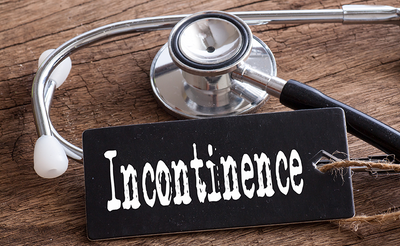Urinary incontinence is the pressure to void urine and the accidental leaking of urine without making it to the bathroom on time. This happens when there is a blockage or problem in a person’s urinary system.
Urine is produced in the kidneys and then stored in a muscular sac called the urinary bladder and voided from the body by a tube called the urethra. Urinary incontinence can occur when bladder muscles are damaged or weak or if something is blocking the path of the urethra. In men, a prostate gland surrounds the urethra just below the bladder. An enlarged prostate gland can obstruct the urethra, causing problems with urination or urine retention. Thus, problems in the prostate gland or its treatment are a major reason for urinary incontinence in men.

As men start aging, their prostate gland grows. In some cases, this enlargement becomes troublesome and gives rise to a condition called Benign Prostatic Hyperplasia (BPH). As the prostate gland grows, it narrows the opening of the urethra and men need to contract harder to get the urine out. This weakens the urinary bladder, thereby resulting in the involuntary discharge of urine. BPH slowly starts affecting and changing the bladder function in older men.
Having an abnormal growth of cells in the prostate gland can lead to prostate cancer. Prostate cancer can be treated by either removing the gland through surgery or destroying the malignant cells through radiation. Radiation decreases the capacity of the urinary bladder and causes spasms, forcing the urine out. Surgery may damage the nerves that help in controlling bladder function. Thus, in both the treatment methods, there is a significant chance of disruption in the functioning of the bladder which leads to urine incontinence.

With the bladder’s retention capacity impaired, the urge to urinate becomes frequent. The inability to hold urine before reaching the bathroom can result in a small leak or soaked garments. The degree of severity depends from one man to another - some may urinate while coughing, sneezing or laughing whereas others may experience severe leakage. Urinary incontinence can significantly impair a patient's quality of life. Patients are unable to sit in one place for a long time or attend any outdoor events. They start looking for ways to quickly escape to the bathroom to prevent any leakage in public.
For some men, prescription or over-the-counter drugs such as diuretics, antidepressants, sedatives, opioids can have an adverse effect on symptoms. Therefore, most doctors suggest the use of absorbent products designed specifically for managing incontinence in men. Urine collection devices such as a condom catheter or a penile clamp can make men more uncomfortable. Adult diapers for men are an apt solution for taking care of incontinence issues. These adult diapers are designed to absorb the flow of urine for long hours, keeping men comfortable and relieving them from going to the bathroom now and then.

Pant-style diapers made for adults can be worn under their garments to provide complete protection against staining their clothes. This is especially useful after a prostate surgery where the patient is prescribed bed rest. Hypoallergenic pant-style diapers for adults can be pulled on like regular underwear and changed quickly. This is immensely helpful for men to recover after their surgery faster and do away with the constant exertion of getting up to use the bathroom. Adult diapers come in various sizes and types – each made to meet the intensity and severity of flow in men. The price of adult diapers and their availability makes them a great choice. While buying adult diapers online, caretakers must be cautious and not fall for low prices that compromise on the quality of the diapers.
In some cases, incontinence during the treatment of prostate problems can go away after a period of time. However, the elderly take a longer time to heal and have to deal with incontinence problems as the bladder muscles start failing with age. This coupled with other health issues like diabetes, blood pressure, kidney failure can increase their chances of urinary incontinence. Making some lifestyle changes can help combat incontinence problems to some extent. By cutting back on caffeinated drinks like coffee, tea, aerated beverages and alcohol, eating fiber-rich foods, maintaining healthy body weight, giving up smoking and using pant-style diapers for adults can be of great help in improving prostate and urinary incontinence problems.





